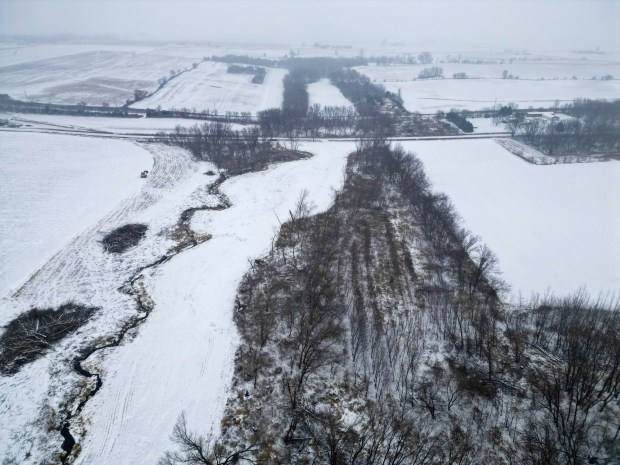A federal judge in Iowa dismissed a lawsuit on Thursday that threatened millions of acres of wetlands, ecosystems that mitigate flooding, reduce water pollution and support biodiversity.
While the lawsuit implicated wetlands nationwide, the battleground was a 72-acre farm in Delaware County, Iowa, owned by Chicago-based investor James Conlan. Conlan has over 1,000 acres of farmland in Iowa, which he leases to farmers who work the land. In some cases, he aims to eventually sell the land to developers.
Represented by the libertarian Pacific Legal Foundation and Liberty Justice Center, Conlan argued that a federal provision colloquially known as Swampbuster, which discourages farmland owners from converting wetlands into cropland, infringes on property rights.
Conlan and his lawyers did not respond to requests for comment following the decision, which detailed how his gripe with Swampbuster originated three years ago when he sought to cut down trees on 9 of his 72 acres federally designated as wetlands. Under the law, this would have made him and the farmer who leases the land ineligible for federal benefits such as subsidies, loans and insurance.
The U.S. Department of Agriculture and several environmental and sustainable agriculture groups countered that compliance with Swampbuster was voluntary. Farmers can drain and till wetlands, but if they do, they cannot expect to receive taxpayer dollars.
An expectation of land stewardship is central to the partnership between farmers and the public, said Aaron Lehman, a fifth-generation farmer and president of the Iowa Farmers Union, one of the several groups that joined with the federal government in the case.
“Thursday’s decision means we can continue to have farm programs that have integrity,” he said Friday afternoon as he planted soybeans on his farm in Polk County, Iowa.
Swampbuster protects 78 million acres, or two-thirds of the wetlands remaining in the continental U.S., according to Food and Water Watch, another group that joined the case in support of Swampbuster.
In the upper Midwest, 30 million acres of wetlands, including over 640,000 in Iowa and 1 million in Illinois, are at risk of being destroyed by industrial agriculture, according to a study by the Union of Concerned Scientists. Over half the nation’s original wetlands have already been destroyed by farming, development and climate change since the 1780s.
“Every day Americans, and especially homeowners — they might not even know about this case — but it was a big win for them. Wetlands in the Midwest and across the country provide billions of dollars in mitigation benefits by preventing people from losing their homes due to floods,” said Katie Garvey, an attorney at the Chicago-based Environmental Law and Policy Center who represented the environmental and sustainable agriculture groups.
Wetlands are natural sponges and filters, absorbing excess water to prevent flooding and catching pollutants before they run into local waterways. They are also critical habitats for a variety of plants and animals.
Garvey and her colleagues were pleasantly surprised by the Agriculture Department’s continued defense of Swampbuster under the Trump administration. The lawsuit was originally filed under the Biden administration.
“We’ve been very relieved to see that this administration is continuing to support the USDA and defend Swampbuster,” she said.
Chief Judge C.J. Williams, who presided over the case, was also appointed to the Northern Iowa District Court by President Donald Trump during his first term.
“I think that part of the reason is that these programs are really popular with farmers and with Trump’s base,” said Dani Replogle, a staff attorney with Food and Water Watch. “I wonder if that is maybe contributing to them being a little bit more cautious with programs that benefit farmers and benefit farming more broadly?”
Lehman warned that the alternative to the voluntary Swampbuster program is a total regulatory environment where farmers don’t have choice on whether to comply with conservation programs.
“The only other options would be neglecting the environment or a total regulatory environment, which would be difficult,” he said.
The fight to over Swampbuster’s fate — and the millions of wetlands it protects — isn’t over yet, however.
Conlan’s team plans to appeal the decision to the 8th U.S. Circuit Court of Appeals based in St. Louis, according to a statement posted by the Liberty Justice Center on X Thursday evening.
“We’re confident that the appellate court will ultimately rule that this federal law is unconstitutional. This law has been taking land from farmers for years, and we look forward to continuing to fight this unconstitutional law,” said the statement, which Conlan’s lawyers referred the Tribune to, in lieu of an interview.



